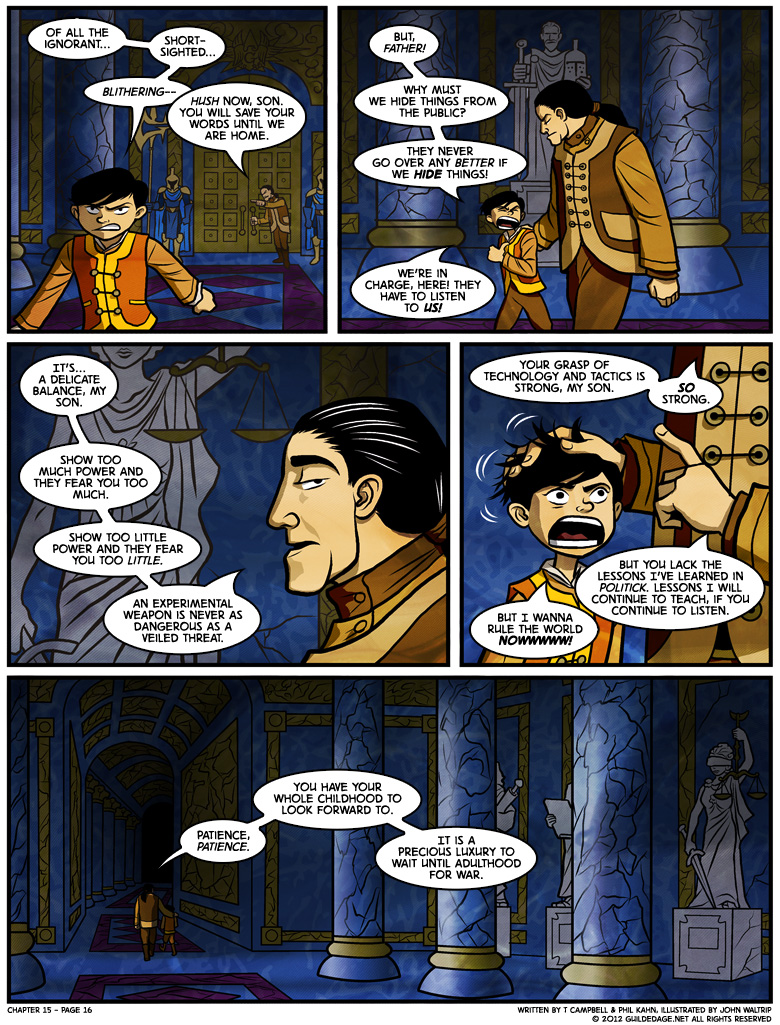Annotated 15-16
 Taro just literally got away with murder and yet he is NOTHING BUT OUTRAGED that the government has the temerity, the GALL, to demand the world’s insincerest apology from him.
Taro just literally got away with murder and yet he is NOTHING BUT OUTRAGED that the government has the temerity, the GALL, to demand the world’s insincerest apology from him.
He does have a bit of a point, though, about how sometimes openness is better. In government as in other areas of life, you can tie your own hands with too much pretense, confusing people who would willingly follow you if you just laid bare your true intentions. But if it’s any consolation, kid, you weren’t actually hiding anything from anybody.
Special guest appearance by the concept of justice in panels 3 and 5! She has a non-speaking role, naturally.











The face on that statue in panel 2 looks a lot like H.R. to me for some reason.
To me it looks more like Best (the end-version).
Iwatani is a great of example of not being able to see the viper in your midst, because you are too close to the situation.
And they missed a golden opportunity to avoid future tragedy by not just drowning the little bastard.
Then his Grace Iwatani would have stayed in control. Would things have been better in the end with a competent dictator?
A government that would have executed Taro* is a government that Iwatani Senior could never have gotten to the most powerful position in. One of those catch-22 things.
*Setting aside the issue of actually just ways to deal with a murderous child, which never came up in the story because, between repeated encounters with Gastonia’s “ah, he’s rich and he only killed nonhumans” government, repeated pure-combat encounters with the protagonists, and his final death at the hands of one of H. R.’s monsters, he never encountered anyone with both the power and the desire to seriously try him at all.
There’s really not as much difference between a murderous child and a murderous adult when it comes to justice as people like to pretend. Oh sure, we have an instinct to want to protect children regardless of how despicable they are because without that our race probably wouldn’t survive — but that’s a separate subject.
It’s really just a matter of extracting whatever amount of restitution is possible and whatever steps are believed to be necessary to reduce the odds of repetition. Children tend to be more malleable, so they can often be treated with a softer touch than adults who are set in their ways, but it really has to be decided on an individual basis. Sapient beings are too complex for one-size-fits-all solutions.
Taro though… He’s pretty far gone. Not sure what his father was thinking. One should never train for manipulation and ambition before training for prudence and foresight.
If he had any prudence and foresight himself he wouldn’t have died to his own kid.
And, I’d argue, he would never have raised Taro that way to begin with.
Killing people is neither a necessary nor a sufficient protection from repeats.
Especially not in fantasy worlds.
History repeats itself for the same reason it must be studied – people remember it as easily as they neglect it.
Killing a murderer isn’t a means of preventing more murders. It simply reduces their frequency and the probability that future victims will be of prior demographics. They’re still going to occur, but the channels by which they do so will subsequently be less predictable.
It’s like consolidating power, in some ways, but you’re diffusing intent and focus instead.
As a survival mechanism, the death penalty serves the purpose of providing populations room to recover from killing sprees, when those populations are of a scale that such things would decimate them.
Because we are a society whose numbers have erupted well past being superfluous (except maybe from a cosmological perspective), we have little need of such a survival mechanism; it is difficult to decimate us even if a large number of us are killed.
We have to instead evaluate murder on a community level. Which means that intuition is more relevant than survival requirements. The death penalty becomes appealing, then, only if we believe “it sets an example that others will explicitly follow.”
History has demonstrated this belief requires gullibility or ignorance of history.
Afterthought: the exception to the logic above is when the incarceration of murderers can be thwarted by conspiracy on the part of their colleagues, for the purpose of organized crime- and/or murder-mongering.
Then killing murderers becomes preferable.
As a blanket statement, sure. Like I said: It needs to be judged on an individual basis.
The man who kills his wife’s lover in a fit of rage is at a very different risk of doing it again than the serial killer who boldly proclaims at his sentencing hearing that he enjoys killing immensely and can’t wait for another opportunity. Depending on culture and time period the former may even be excused entirely, while the latter is generally executed in all but the wealthiest of places where the cost and risk of feeding and keeping an otherwise useless psychopath is considered to be trivial.
But my original point was that the only difference child vs adult really makes is in the average likelihood of reform being possible. A child like Taro is like a rabid puppy. Cute, cuddly, and a mortal danger to everyone around him. To forget that last part merely because of his age is to court death.
Was the balance (just justice) right in the frame that Iwatani speaks of the delicate balance of fear something ordered on the script or another Waltrip+1?
Really feels like one of those sneaky Johnhancements.
You’re right, BMO3, that’s one of mine. I just couldn’t resist. Seemed like the perfect place for it. ;-D
I want ice cream.
Wouldn’t recommend eating it with the Iwatanis, particularly, but not limited to, if you’re anything less than absolutely certain you’re somehow more valuable to them alive than dead.